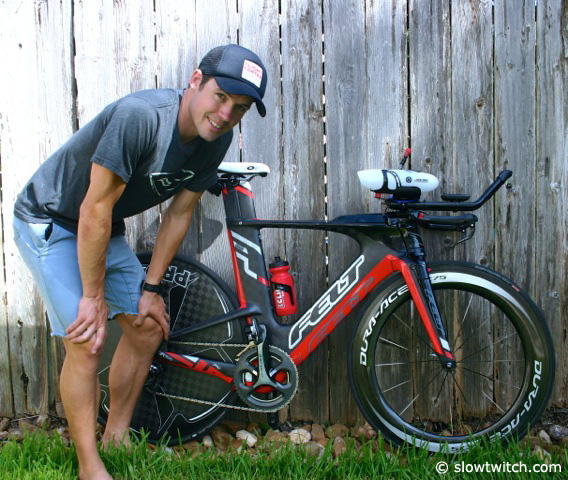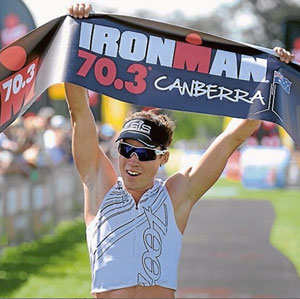Aussie Tim Reed is flying high
Tim Reed won Ironman 70.3 Buffalo Springs Lake this year and he is now headed to race 70.3 Vineman. He chatted with us about these events and more.
Slowtwitch: How are you my friend?
Tim Reed: Terrific thanks Herbert.
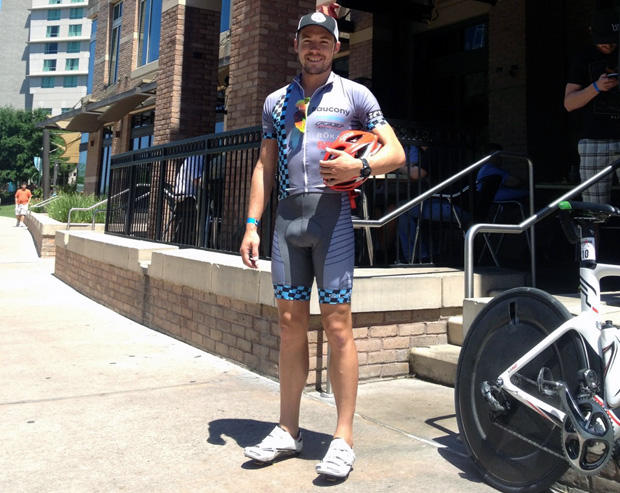
ST: You took the win at 70.3 Buffalo Springs Lake in very rough conditions. Talk about that race.
Tim: The wind and heat meant almost identical conditions to Geelong 70.3 earlier this year where I blew to smithereens early in the run but managed to hold onto second place. I’m not sure why but despite my size I seem to ride well in crosswinds where other guys seem to struggle. Perhaps growing up on a small Australian island regularly bashed by strong winds with riding my only choice of transport paying dividends. So the plan was to try my luck on the bike but this time hold it together on the run. I drank a lot more than in Geelong, backed off the last 30-kilometers and stuck to monitoring my heart rate on the run which I don’t normally do and thankfully held cramps off long enough to cross the line ahead of Jordan Rapp, who applied solid pres-sure throughout the back half of the race.
ST: Jordan Rapp tweeted you were primed for the win when you showed up to the starting line in your trademark Budgy Smugglers. Is it a psychological advantage or is there another reason they are your go-to race suit of choice?
Tim: I raced a couple of events in tri shorts this year because I didn’t have a pair of Smugglers that matched my Saucony team tri top. While racing Cairns 70.3 a few weeks ago I noted how the crowd support just isn’t the same compared to when you’re racing old school with a mid-drift tri top and flashing the white thighs. So I guess that’s psychological. However there are physical benefits to the man bra including no tri short chafe and more effective ventilation.
ST: How have you pulled up after BSLT?
Tim: Unusually well. I guess that is the result of the conditions not allowing anyone to run too fast and break down our muscles too badly. I’m training in The Woodlands, Texas, which is a maze of trees to navigate. I got lost a few days after the race and my half-an-hour recovery run turned into 2.5 hours. I’m probably still recovering from that more than the race.
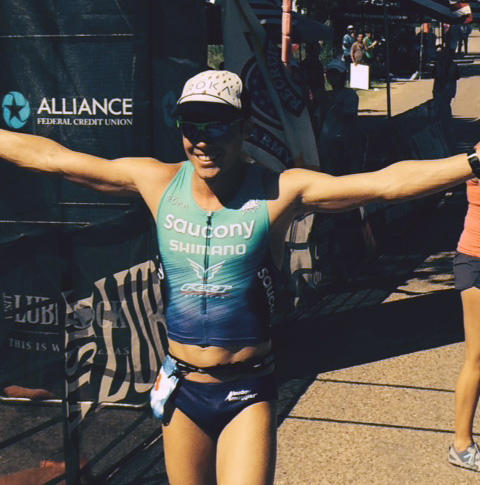
ST: What is your overall plan for the rest of the year?
Tim: The primary goal is to race to my full potential at the 70.3 World Championships. So I head home after Vineman 70.3 for a block of training there, a tune up race at Challenge Gold Coast before racing worlds in Mont Tremblant. From there I’m back home to Byron Bay for a few weeks squeezing in some Ironman training for Kona should I qualify. The goal for Kona is to have a didactic experience that contributes to my success in that race in the years to come. I’ll then have a mini break before targeting the start of the Aussie season events and quite possibly Challenge Bahrain.
ST: You’ve raced big money races like Hy-Vee in past years. What do you think of the recent announcement of Challenge Bahrain and their $500,000 prize purse?
Tim: Of course it’s absolutely terrific for the sport. Big money creates global interest in an event and it will surely attract top athletes from the various formats of our sport. Whether I race will depend on how cooked I am by the end of the year. I’ll have five North American trips in the travel bank by the Challenge Bahrain and I’m not sure I can face up to another trip away from my family unless I’m 100% confident I can put in the training prep that will be required to mix with what will be a very classy field.
While these big money events are incredible assets to the professionals I still strongly believe that for sustained long term growth and for triathlon to start mixing it with mainstream sports we need a highly television friendly format interesting to watch for a non-triathlon spectators such as the old F1 series, which brought in so much corporate sponsorship back in the ‘90s.
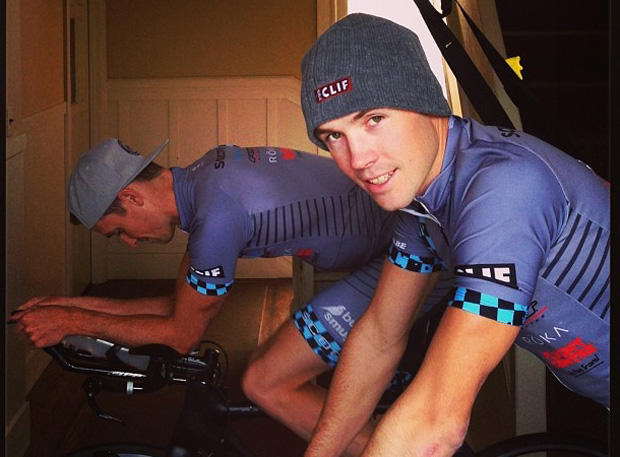
ST: But is that maybe simply a bit of wishful thinking?
Tim: Perhaps I’m an idealist but I think with the right corporate backing with a longer term view anything is possible. Other options are simply making the pro races of the current formats more spectator or TV friendly. Greater variations – team time trials, triple sprints, a mix of drafting and non-drafting events, crazy courses, shorter looped courses, eliminator races and starting the pro race much later so amateur finishers can watch. Just ideas with no real consideration of the logistics involved. I bet every race director is shaking their head right now at my naivety.
ST: You tend to race in both Australia and in the US numerous times throughout the year. How do the two racing scenes compare to one another?
Tim: Because everyone seems to swim well in Australia, it used to be a group swim, easy ride and a run off for most wins. However Australia brought in a 12 meter drafting gap (back wheel to front wheel- two more meters than the US) which has really changed the dynamics of the racing in Australia pushing young Aussies to focus a lot more on their cycling which really suits the US style of racing.
A few years ago I would have said that the US racing was higher quality than Oz however with a lot more Aussies and Kiwis spending the majority of the year in Australia and the vast number of races in the States somewhat diluting the depth of top pros at some US races it’s no longer the case. Now it’s very much race dependent but you certainly get some very strong fields assembling in Australia. I would love to see some of the US pros come over and race more often down under.
ST: How does racing on both continents impact sponsorships?
Tim: This is where the U.S still really stands apart. The prize money is now similar between countries but due to the triathlon market size in the US there does still seem to be more opportunity for support over here. Thankfully my sponsors recognize the nature of the triathlon media is largely digital and social media so that a win in Australia, Asia or Europe can still provide widespread exposure to their targeted U.S audience.
ST: We’ve heard you put in a lot of time researching your equipment choices. Can you give some examples?
Tim: I’ve never been a guy that feels I get too much benefit training the same volume as most other pros at least for 70.3 racing. Either I simply reach a point of no added benefit sooner then other athletes or they do a lot of junk training. I find I get much more benefit out of finding the time to do a lot reading and testing to find those one percent differences that can really add up. I do a lot of roller and field testing to trial tires, tire pressure, position and more. I haven’t had the time yet to get into the wind tunnel although I hope to soon. In the mean time, I try and replicate the position and choices of guys who have had a lot tunnel time. I worry about little things that are not overly scientific by any means but when it’s less then 1-2% between 1st and 5th place I’ll use what I can to get an edge.
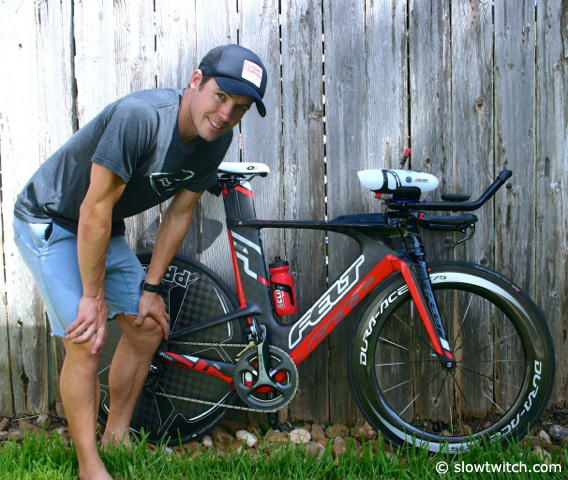
ST: Any particular reason why you chose The Woodlands instead of Boulder where most Aussies tend to go?
Tim: I don’t seem to respond well to altitude, at least in the shot term. As most of my US trips are 3-4 weeks it’s just not long enough to adapt and race well. Plus I like to train at quite a high intensity and less oxygen isn’t overly conducive for recovery. I feel I get a real performance boost from training in hot, humid conditions. I’m quite asthmatic and humidity also really helps my breathing. The Woodlands has amazing facilities, great cycling and running out the doorstep and a booming triathlon scene with many generous locals being extremely helpful.
ST: You have Vineman 70.3 this weekend where you finished runner-up last year. What can you tell us about that course and how you approach a course that suits you?
Tim: I think it’s a real advantage to know this course. As Bevan Docherty showed last year, you can easily get out of sight, out of mind. So much so that once Joe Gambles and I caught the lead group I didn’t even know Docherty was up ahead until 15 kilometers to go when Terenzo Bozzone informed me.
I factor in both the course and who’s racing. With the depth of the field that will be racing on Sunday I realize that I can’t try any heroics early on in the race because there are too many great guys to counter an aggressive move but rather try and stay near the front and wait to see how things play out. I really like this run course so if it comes down the run I wouldn’t mind duking it out there although with the likes of Tim Don, Docherty and Jesse Thomas, perhaps that’s a dumb thing to wish for.
ST: There are lots of younger pros on the circuit now. Any advice you have for them?
Tim:: I guess the main thing I would recommend is that you don’t have to be a full time professional to race pro. Thinking you can survive the first few years of pro racing off your triathlon income is wishful thinking. You can still work a couple of days a week and make huge performance improvements without the stress of having to worry about how to pay for the next race’s travel expenses. I’ve seen too many talented young guys only last 18 months because they get sick of living on or below the poverty line.
Unlike many other sports, you have time in triathlon. Guys are reaching their peak in their mid-thirties. Crowie, Bennett, Macca and many other hitters, finished their university degrees before they had a crack. Think big picture. I’ve used my university education and triathlon experience to run a coaching business for a number of years now, which has really helped me enjoy my racing because I’m not entirely financially dependent on racing. I’m actually now expanding with two other guys to offer a really great membership based coaching service, Reed Performance Group which will be launching soon.
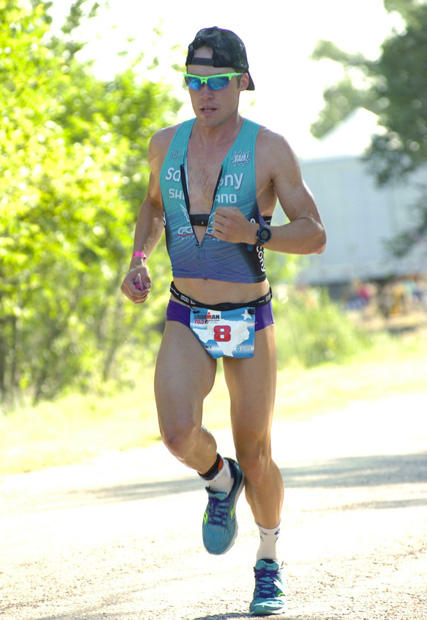
ST: But the thought is that you may have a Pro license, but you are not a Pro until you make a living from it.
Tim: I can see some sense to that however there are top sportsmen in the world who make more from there other investments or businesses then from their sport even though sport might be their main occupation. At the other end of the scale, some guys may live very cheaply off only their triathlon income but that doesn’t make them more pro than someone who makes more than them from triathlon but also has other income sources allowing them a very different standard of living. I don’t think it would matter how much I made from triathlon I enjoy coaching and would never want to completely stop it. Does that mean I’ll never fully be a pro? I agree that having a pro card certainly doesn’t mean your a professional athlete. I’ve been there.
ST: What are your thoughts on doping and doping penalties?
Tim: In my opinion there needs to be more severe punishments for blatant cheating with a minimum 4 year ban or longer. I understand the argument that every-one makes mistakes and deserves a second chance etc however you’re not putting that person in jail. They can have a second chance at something else in life or wait out the 4 years. The deserving people that are robbed by some cheating never ever get compensated and may miss out on their second chance for the many rewards that a win might have given them. I think contaminated foods or supplements that are clearly proven and contain substances that may not even be beneficial need to be treated case by case according to the evidence. As for recreational drugs, while I in no way condone their use I fail to see why professional athletes should be treated any different to the general population in this area. They’re performance detracting drugs.
In saying all that, I also feel fortunate to be in a sport where it’s very black and white. I strongly believe the vast majority of triathlon pros are clean and so to take PEDs is unthinkable.
ST: Well….. Let us talk about your young family back home. How do you cope with the demands of being away for long stretches of time?
Tim: It’s really difficult. We cope through a lot of Skype time when I’m away and making sure we spend quality time we’re back together. My wife grew up in Denver and we are planning on doing an extended stint altogether in the U.S if we have a second child.
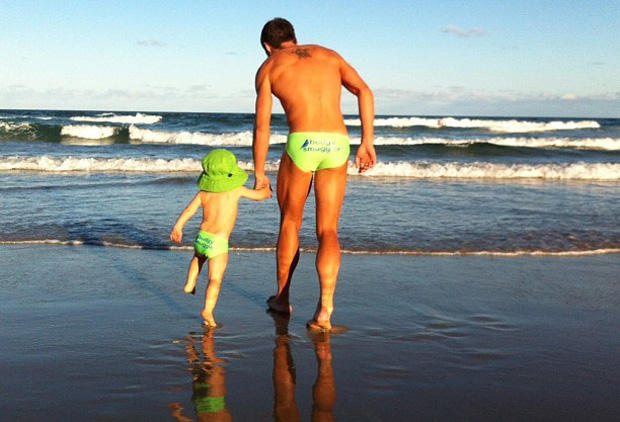
ST: What do you see yourself doing in 5 years?
Tim: That’s a tough one. Hopefully at the peak of racing career but starting to plan my life for post racing. I certainly don’t want to race much past my peak unless it made a lot of sense financially and allowed a great family life.


